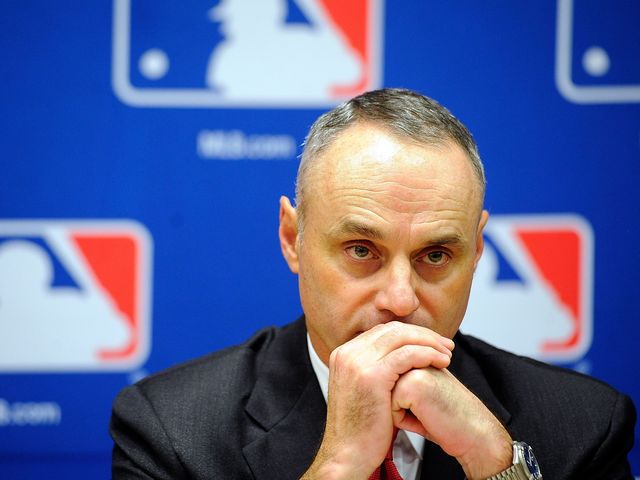Wagering On Baseball? MLB Comish Manfred Open To Talking
by Joe Favorito @JoeFav
Sports in the United States and the relationship with some form of advanced gaming and gambling continue to do a very slow and seductive dance toward an eventual plan, and the gyrations continued all weekend at the annual MIT Sloan Analytics Conference, the ever-evolving stats geekfest that this year drew over 3,000 media personalities, innovators, entrepreneurs, visionaries and business leaders to the Boston Convention Center for two days of stats filled discussion and debate.
It was the largest-ever gathering for the conference, the brainchild of two MIT grads, now Houston Rockets now GM Darryl Morey and VP of Customer Marketing & Strategy, The Kraft Sports Group Jessica Gelman, who saw the continued confluence of analytics and data into every aspect of sports business, and as that area of evaluation and innovation has grown, so has the event.
While wearable tech, wireless devices and every form of statistical breakdown was on the docket, the issue of gambling as a new frontier was a constant subject when the biggest of the big, NBA commissioner Adam Silver, MLS commissioner Don Garber and MLB commissioner Rob Manfred all took the stage at various times. While Silver has been the out-front champion of acknowledging and then finding ways to adapt some form of legalized national wagering, it was really Manfred in his new role that had the most to say on the issue in a Friday conversation with MLB Network Brian Kenny. In years past, especially under former commissioner Bud Selig, the notion of anything progressive with gambling and baseball would never have even been part of the conversation. But baseball’s latest leader has taken a more progressive and outspoken stance on several topics, from international play to the speed of the game, and the “someday” notion of legalized gambling seems to fit the bill.
“In terms of the ‘away from the field’ issues associated with the legalization of gambling – I think that enough has happened out there that it’s incumbent upon me and my staff to take to the owners the developments in this area, to have a conversation about some of the rules that go beyond the play of the game on the field that we’ve had traditionally in baseball and revisit those,” he said during the conversation.
He later told CNBC that the gambling “landscape is changing very quickly” but that no one should expect “players or on-field personnel” betting on games anytime soon. Manfred admitted again that the “industry will have to take a hard look at” the larger issue of legalizing sports gambling and went on to praise Silver for taking the leadership role in the conversation and driving the talk to see if there is a Federally-controlled system that all sports would participate in going forward.
The great irony in such a discussion Manfred pointed out, is that the actual office he now holds is a product of the 1919 Black Sox scandal which has forever changed the face of gambling on baseball. Judge Kenesaw Mountain Landis was appointed by the owners to basically keep themselves and the clubs in line when it came to the integrity of baseball, and the sport has had a zero tolerance rule ever since when it came to gambling and baseball of any kind, with the Pete Rose case still being the greatest challenge to the issue of gambling and baseball.
The other irony is that baseball’s long standing preponderance with numbers has actually given rise to much of the conversation on gaming and sport in America today, starting with the advent of what was then Rotisserie Baseball and is now full-fledged fantasy baseball, and then moving on to the concept of “Moneyball” and the new era of detailed analytics in sports. Without baseball and its analytic preponderance, who knows where all this talk would be today.
Now where legalized wagering goes in the near future is anyone’s guess. Later in the weekend a panel hosted by ESPN The Magazine editor Chad Millman had the consensus that legalized federal rules on sports gambling is probably four and a half to five years away, but the growing opportunities in daily pay fantasy games for all sports, including baseball (where MLB.com has a minority stake in the uber site Draft Kings), continue to escalate with each passing week. No less than ten companies with some sort of fantasy attachment were on display at MIT, with hundreds more wannabees roaming the halls.
What was clear from Manfred’s comments with regard to legalized sports wagering is that he, like Silver, see the potential opportunity in the future and are willing to examine and publicly discuss the risk and the reward. In a world where teams are constantly battling for other new areas of revenue to offset the rising costs of doing business without continuing to zap the fans pocketbooks, baseball and legal gambling may make for strange, but smart bedfellows down the line, especially now with a commissioner willing to engage in the discussion for the first time.

